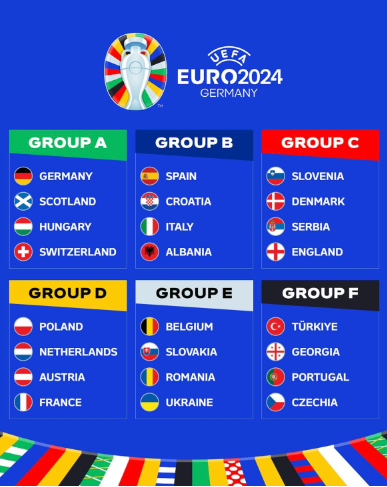The Vaterland might be such not exclusively to the German people(s) but for all football fans in the Old World. Indeed, with its collection of four World Cups and three European Championships – “Euros” – Germany is the most historic footballing nation east of the Atlantic Ocean, at least when assessing national team success statistically. It is good news, then, that for exactly one month, between the 14th of June and July, the most prestigious continental football competition, the Euros, will be hosted by none other than the European fatherland of the “beautiful game.” This is a breath of fresh air for traditionalists subsequent to the three most recent editions of “major tournaments” – World Cup 2022, Euro 2020, and World Cup 2018 – were held in much less orthodox locations: 2018 was in Russia; 2020 was an itinerary across eleven nations, including exotic Azerbaijan; and, above all, besides from being in the oddity of Qatar, 2022 was also during the winter.
On 2 December, the draw for the tournament was made by organisers UEFA – Union of European Football Associations – in Hamburg. However, the civility was interrupted by infiltrators who, having hidden a smartphone in the Elbphilharmonie venue, loudly and lengthily played lewd female moans at their liking by calling the phone from home after having set the disturbing noise as its ringtone.

Six groups of four teams were drawn. In all groups, the round-robin formula will be administered, meaning that each team is guaranteed a minimum of three meetings, which UEFA has already scheduled. The teams will gain three points for a victory, one for a draw, and zero for a defeat. The top two per group will progress to the knockouts, the first stage of which is the round of sixteen. If you end third, you still have a two-thirds chance of advancing, as the best four of the six third-placed teams will join their twelve contenders to complete the round of sixteen. For a thorough understanding, read articles 20-22. Click to view all squads.
“Group of death” is the expression attributed to the group(s) containing a higher number of good teams than the proportion of assured number of spots the group offers for the upcoming phase, hence possibly being fatal for no less than one good team. A good team is one that, in an average group of the event, would be a favourite to qualify. In these Euros, groups B and D are the evident groups of death. On paper, the group of death is Group B, in the sense that it comprises three of the four teams in the top ten of the FIFA – Fédération Internationale de Football Association – world ranking, Spain in eighth, Italy in ninth, and Croatia in tenth. Below are some masked, even controversial, predictions about the group always reserved for the hosts, Group A, and the very Group B.
Group A: Trust in the good old Magyars, World Cup runners-up in 1938 and 1954 and homeland of heroic striker Ferenc Puskás, amid others. The Hungarian selection put up a beautiful fight in the group of death of Euro 2020, taking on the previous World Cup (2018) winners from France, the fresh Euro (2016) victors from Portugal, and the historically toughest Germans. Ceding to Cristiano Ronaldo’s Portugal solely in the 84th minute, Hungary took the lead against France and twice versus Germany, to then be caught up 1-1 and 2-2, respectively, again at that doomed 84th minute in the latter fixture. Despite Hungary not making it out of the group with their two points, not only were they undoubtedly among the sixteen most worthy nations to lift the cup, but perhaps the top eight. The stack of players to be called to Germany by their six-year-long coach, Italian Marco Rossi, will be similar to those who just about transformed the last group of death of the contest into a European fairytale. Luck changes, and chances are fortune will smile on Budapest next month. Hungary to pass relatively comfortably, not in the nick of time in third.
Group B: The Balkan footballing hierarchy is shifting. Say, albeit not confidently, that group favorites Spain and reigning (2020) champions Italy terminate the group in first and second. Most see the group as a three-horse race, adding Croatia to fellow Catholic Mediterraneans. But, if it has not already, the “golden generation” of the Croats is dying. Captain Luka Modrić could well be the greatest to have ever worn the iconic chequered red-white Croatian jersey but is nearly 39, as much as half a dozen years too many for a “midfield maestro,” typically a role requiring you to run for the full 90 minutes and beyond in all seven necessary matches to win the Euros. Yet, Croatian trainer since 2017, Zlatko Dalić, expects Modrić to do this in what will surely be the closing major tournament for the central midfielder and reportedly for him too. Alongside Modrić, who will be at his fifth absolute and consecutive Euro, Marcelo Brozović is projected to start. Brozović is in his thirties as well, not to mention that one year ago he decided to essentially “hang up his boots” in club football by transferring from top club Inter Milan to the Saudi “oil league.” The final of the predicted midfielders in Croatia’s 4-3-3 starting line-up, Manchester City’s 30-year-old Mateo Kovačić, promises better, but he is no prime Modrić, the man who led the “land of a thousand islands” to two consecutive World Cup podiums, contributing heavily in his nation’s silver medal in 2018 and bronze in 2022. Then there is Ivan Perišić, 35, who is usually in the starting eleven as a forward. This time around, he is a potential starter, injury permitting. The aforementioned athlete no longer represents a top club or league, though honourably continuing his career in Europe. All the more romantically, he returned to his Dalmatian hometown, Split, to the club that raised him, Hajduk. Up front, colleagues Andrej Kramarić and Ante Budimir, both 32, will get a lot of playing time in their legs. In principle, experience is a luxury. However, a centre and front line composed to this extent of “grandpas” does not look bright, especially since the once centre pieces Modrić, Brozović, and Perišić are now truly rotten, whether they be exhausted, rusty, or sore. A midfield and attack are not exactly a defence, where “the older, the better” rule generally applies until you hit the approximate 40-year-old ceiling. Nevertheless, beware that Croatia is rather solid at the back.
On the other hand, Albania, a predominantly Muslim nation participating in Euro 2024 like Turkey, beat Czechia, Poland, and a surprisingly competitive Moldova to first in its qualifiers group. In Germany, the Albanians will look to take advantage of their northern Adriatic neighbour’s frailty and, why not, imitate the Brazilian journey of underdogs Costa Rica, who in 2014 defied all odds in the World Cup group of death with the triplet Italy-Uruguay-England, not just surviving the group but dominating it, legendarily obtaining seven from nine points. If Albania manages to avoid losing to work-in-progress Italy – after all, trainer Luciano Spalletti merely began his position as “the most criticised job in Italy” in summer 2023 – in their opening encounter on 15 June in the privileged night-time setting of the Westfalenstadion, the most capacious of all German arenas with its more than 80.000 seats, they are in an ideal place to play what is considered their key tie in the group, Croatia-Albania on 19 June at 15.00 CET. Not to mention that encountering Spain third comes in handy because the Iberians are the most trusted of the group to be arithmetically through to the succeeding round by that point, maybe even in first, conceivably unwinding a bit in that case. Furthermore, Albania will battle Spain when rested for thirty hours longer, Spain-Italy being on 20 June at 21.00 CET. Albania will finish above Croatia, going as far as causing a vital upset and making the knockouts.
Bonus: The remaining group of death, Group D, will see Austria pass. They are due to be the “dark horse” in Germany.
But who do the people say will take first prize? In this order, France, England, Germany, Portugal, Spain, Italy, Belgium, and the Netherlands.







